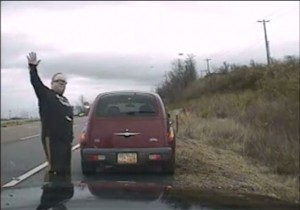The lawsuit brought by a documentary filmmaker and his friend, against the City of Collinsville, was dismissed Friday after the insurance company representing the City settled the suit for a combined $100,000.

Terrance Huff waves to Micheal Reichert after being allowed to continue his trip following a Dec. 4, 2011 traffic stop that became the basis for a federal civil rights trial.
Filmmaker Terrance Huff agreed to accept $60,000 and his co-plaintiff, Jon Seaton, $40,000 from Argonaut Great Central Insurance Company, the City’s insurance carrier in the case. The settlement document notes that the City admits no fault in the now famous traffic stop from which Huff created a video titled “Breakfast in Collinsville.” (The unedited video can be seen here)
In a statement released Tuesday, the City distanced itself from the decision by the insurance company.
“The City of Collinsville was not involved in the decision to settle this lawsuit and continues to assert that no wrong doing was done on the part of the City or the Collinsville Police Department,” the statement indicated.
Attempts to reach Argonaut Great Central Insurance Company and James Cook, of Walker and Williams PC in Belleville, who represented the City of Collinsville in the negotiations, were unsuccessful.
Huff’s and Seaton’s attorney, Louis Meyer, of the Meyer and Kiss, LLC law firm in Chicago, said they essentially won the case when the United States Seventh Circuit Court of Appeals ruled that Reichert had violated the plaintiffs’ Fourth Amendment rights. The stop should have concluded, the court ruled, when Reichert handed Huff a written warning for allegedly swerving across the centerline of the highway.
After the ruling, Meyer said, the question was what the jury would award in damages if the case continued. Because the offense committed by Reichert was to hold the plaintiffs for 34 minutes too long, there was a possibility that a jury would grant both Huff and Seaton a small award, if they won the case.
“This wasn’t a case where drugs were planted or they were beaten up…that was a concern for us,” Meyer said. “My clients probably did better with the settlement than they would have with a trial.”
Because it was a civil rights case filed in Federal Court, settling now may have been more cost effective for the insurance company. If a jury rules in a plaintiff’s favor, regardless of the amount of money awarded, the plaintiff’s attorney has the right to seek payment for all fees incurred.
“Where this case probably would have gotten expensive was attorney’s fees,” Meyer said.
Before the lawsuit was filed, no official complaints against Reichert were filed by Seaton and Huff. The lawsuit claimed Reichert fabricated probable cause to stop Huff’s vehicle on Dec. 4, 2011, that Reichert had the drug-sniffing dog falsely alert on the car and that Huff’s civil rights were violated as part of the process.
When Williams, who was the Collinsville police chief at the time, was first informed of the “Breakfast in Collinsville” video, he sent a copy to Steve Wigginton, the United States Attorney for the Southern District of Illinois, and Tom Gibbons, the Madison County State’s Attorney, he said. Both responded within 24 hours to say they saw no problems, even if Huff or Seaton chose to file a complaint, Williams said.
Meyer said the Department of Justice and Madison County receive money from Collinsville when drugs are seized during traffic stops and, therefore, have an interest in maintaining the current practices.
“They have an incentive for officers to make these seizures,” Meyer said.
Meyer also said he believed that the reason the City of Collinsville refused to comply with his and Huff’s requests to provide videos of other stops by Reichert is that it will implicate them in wrongdoing.
“We think we were just cracking the ice on Collinsville’s drug interdiction stops,” Meyer said.
Now that the case is settled, Meyer, who specializes in civil rights law, will not seek the videos or pursue other action against Collinsville for their practices with drug interdiction stops. “I have plenty of other cases,” he said.
Williams said the City withheld the videos because they had no interest in Huff making further self-serving videos. The plaintiffs filed a motion that more videos of Reichert’s stops be provided as part of the discovery process, but, before a ruling could be issued on the motion, the case was settled, Meyer said.
Huff posted a comment on YouTube indicating that the City was defying a court order to turn over the tapes. Meyer said his client must have misspoken.
Attempts to reach Huff and Seaton for comment were unsuccessful.
“Breakfast in Collinsville” was not Huff’s first film project alleging police misconduct. After being charged with speeding, menacing and disorderly conduct in his native Hamilton, Ohio, Huff made a 2005 film called “The HPD Stories.” The documentary filmed others who claimed to have been the victims of police misconduct.
A Cincinnati newspaper published a 2006 story about “The HPD Stories,” including why it was made and some potential factual shortcomings of the film. The article can be found here.
Huff was convicted of speeding and menacing in the case, but acquitted on the disorderly conduct charge. He appealed the verdict, but the appeal was thrown out in March 2006 for being “wholly frivolous,” because it was based on a clerical error that initially indicated that Huff was found not guilty of the menacing charge.
Huff mentions the video to Reichert during the stop in Collinsville, saying that he had previously been a victim of police profiling.
Reichert was terminated from the Collinsville Police Department in 2006, when Williams was the chief of police, following a conviction for selling knock-off Oakley sunglasses. The firing came after a 2005 ruling by the United States District Court for the Southern District of Illinois, in the U.S. V. Zambrana case, that Reichert’s conviction caused a lack of credibility. The States’ Attorneys for Madison and St. Clair counties indicated that they would not prosecute cases for which Reichert was the sole, or the main, material witness.
Reichert contested the decision and lost in the Circuit Court of Madison County, but won on appeal in 2009 to the Fifth District Appellate Court of Illinois, which ruled that Reichert’s conviction could not be used to impeach his credibility in the circuit courts of Madison and St. Clair counties. Reichert was reinstated and is still a member of the department.



